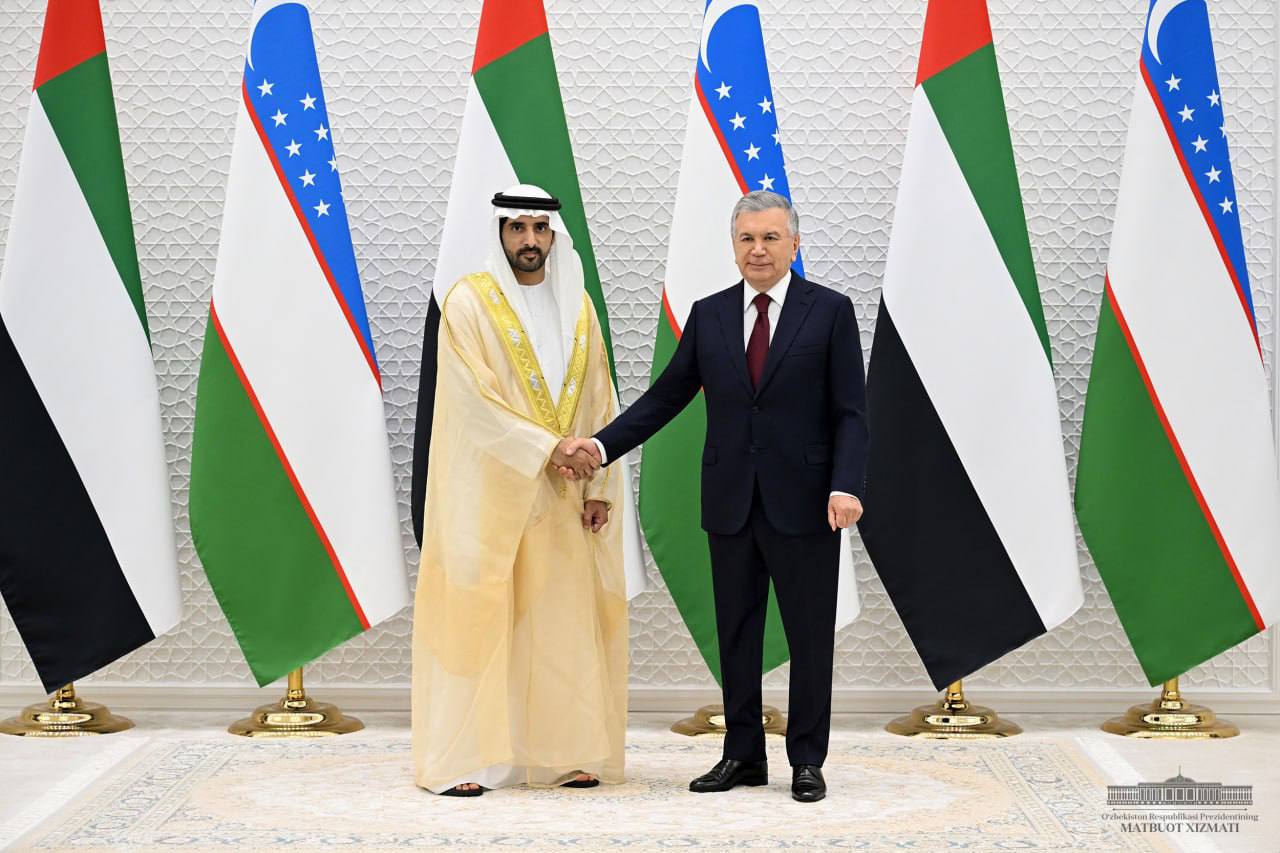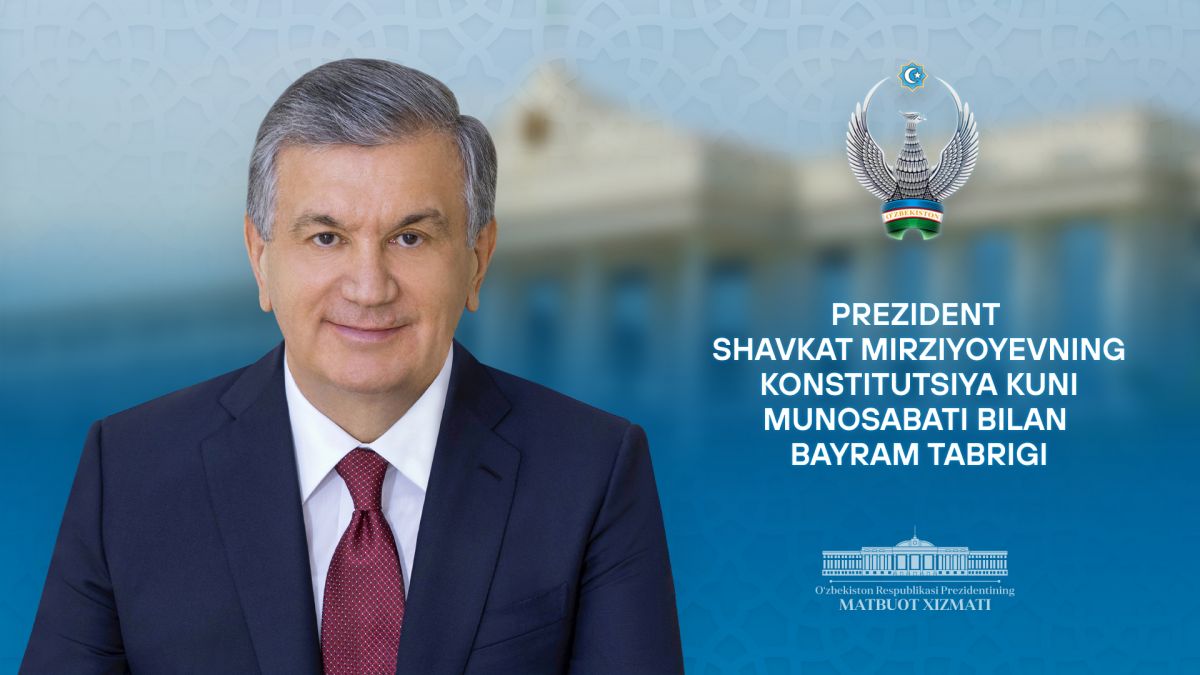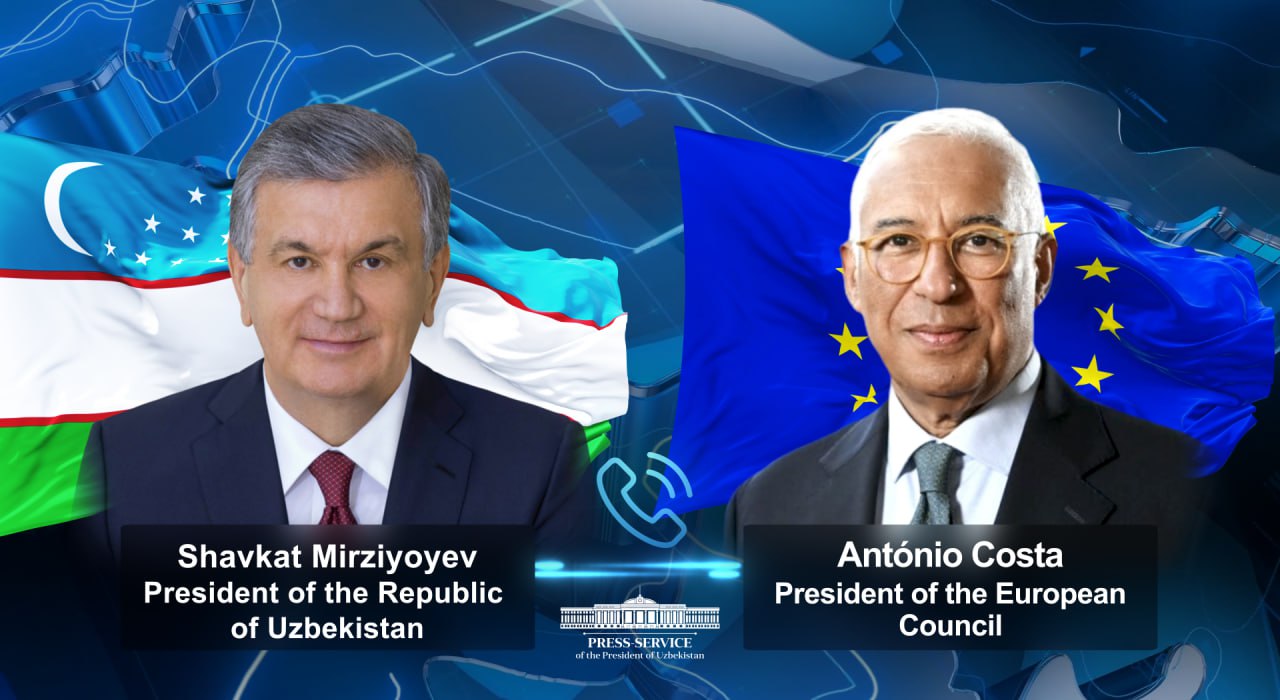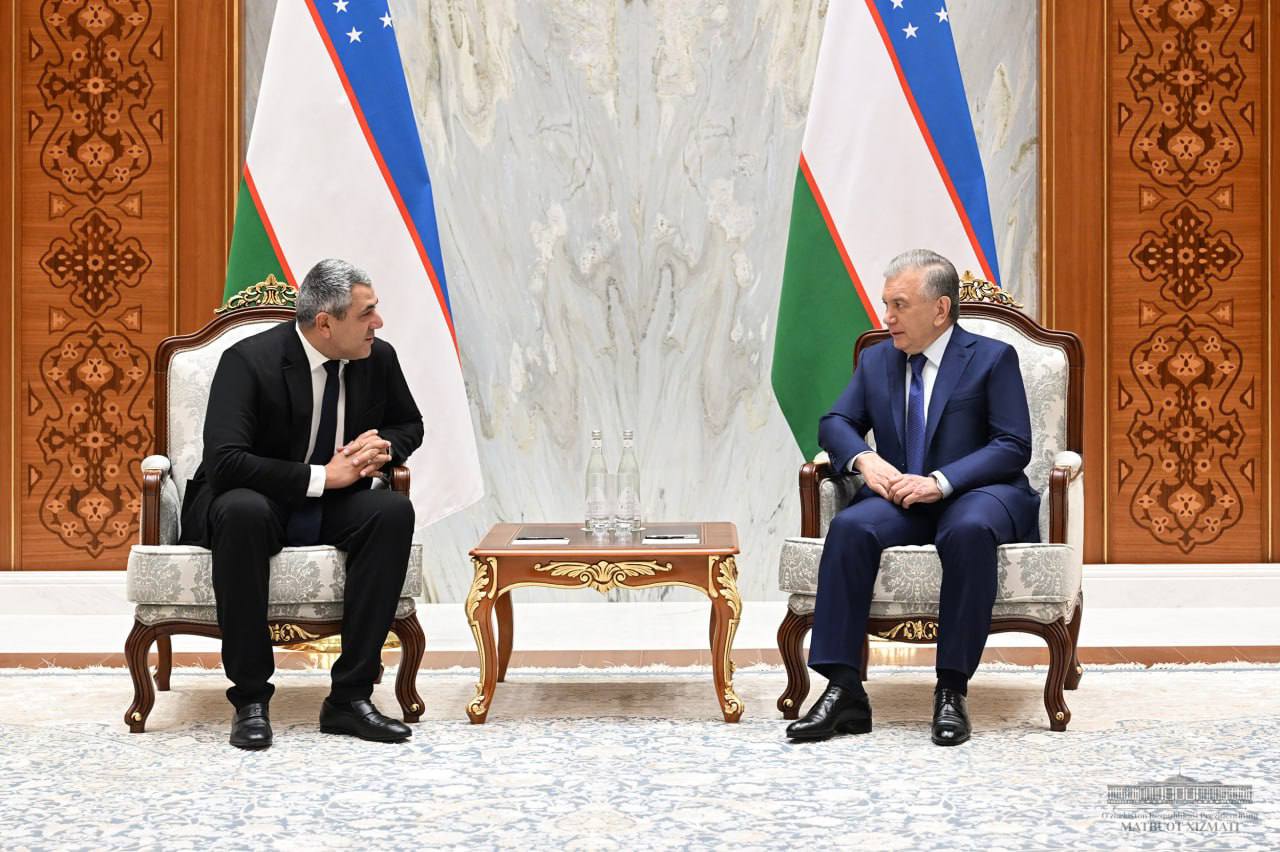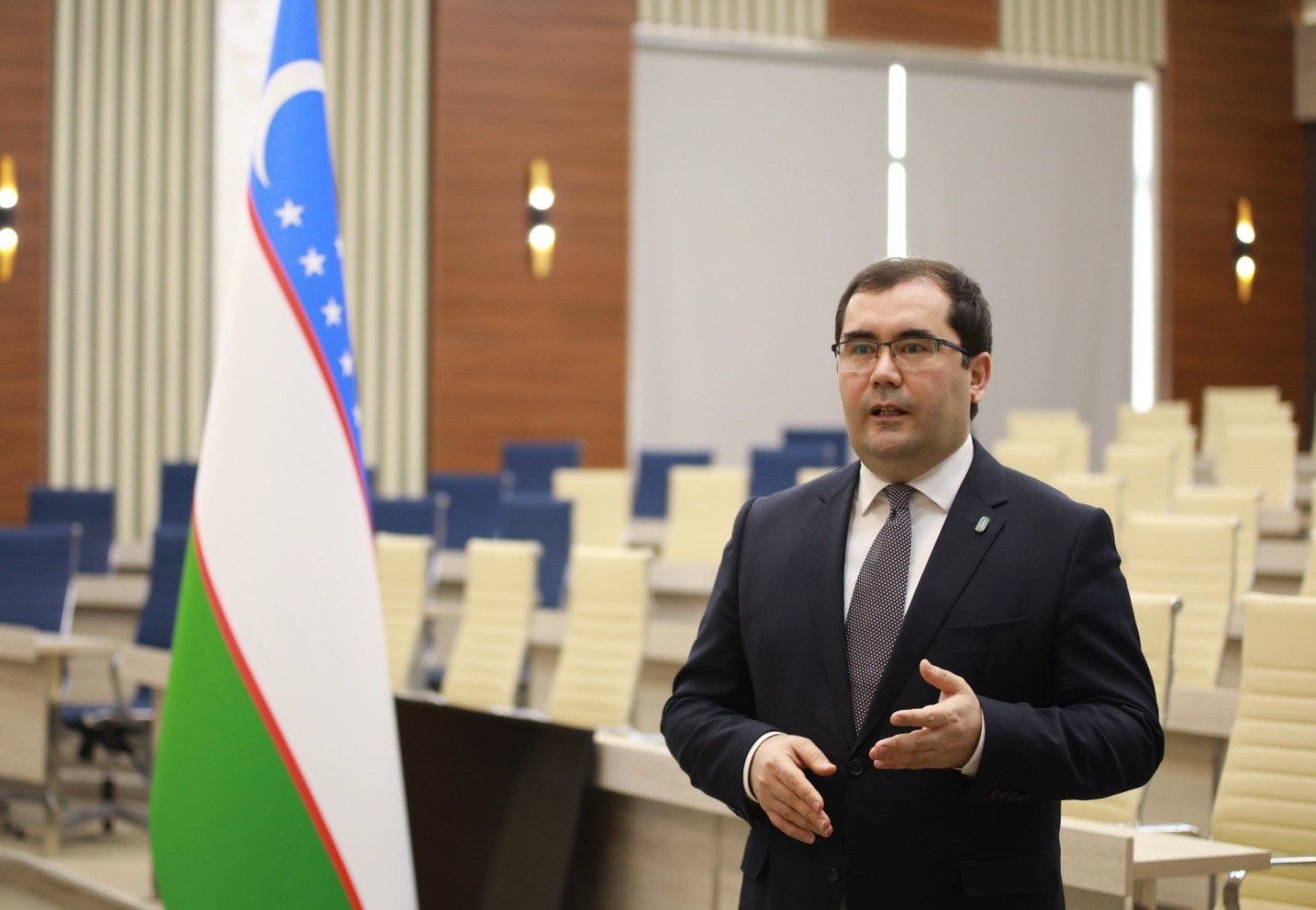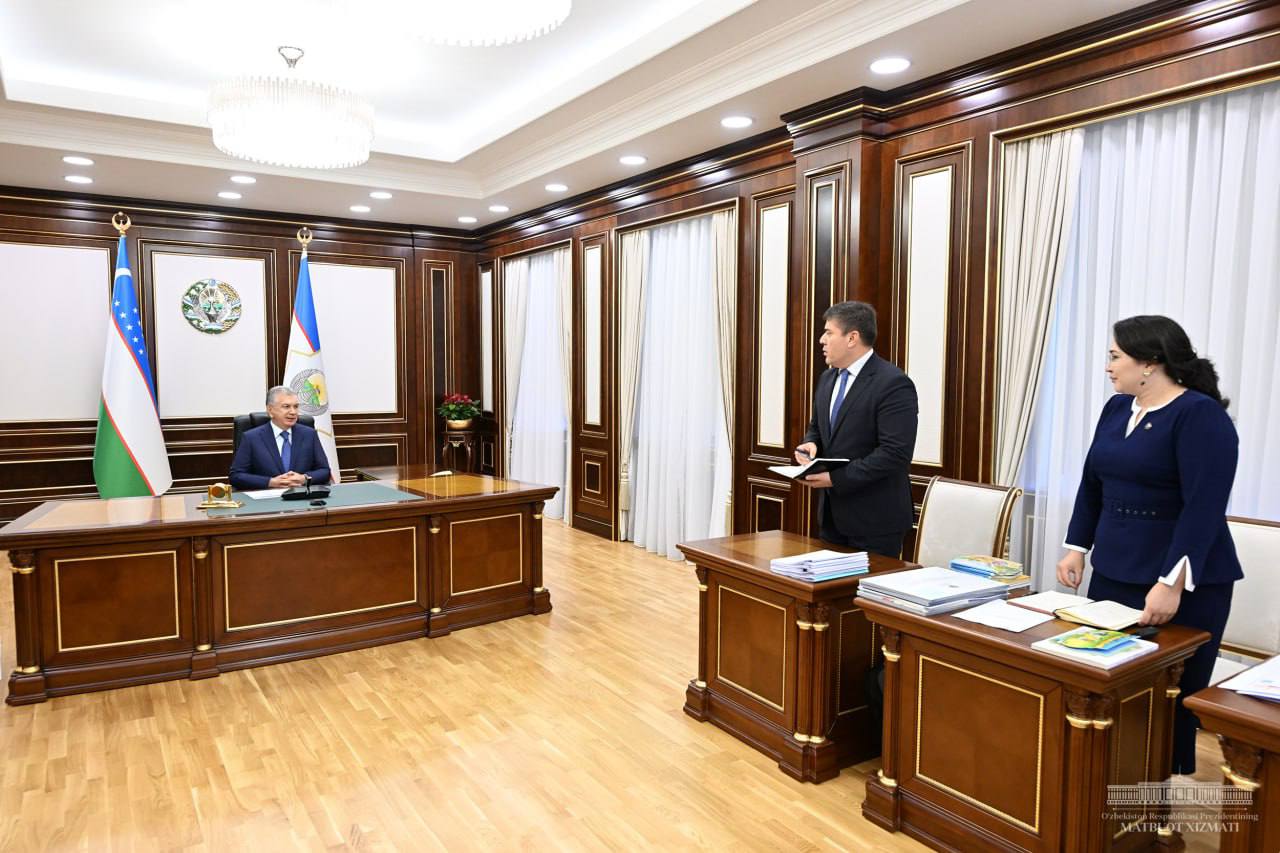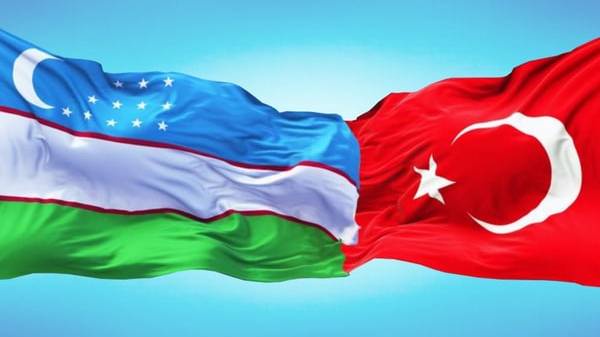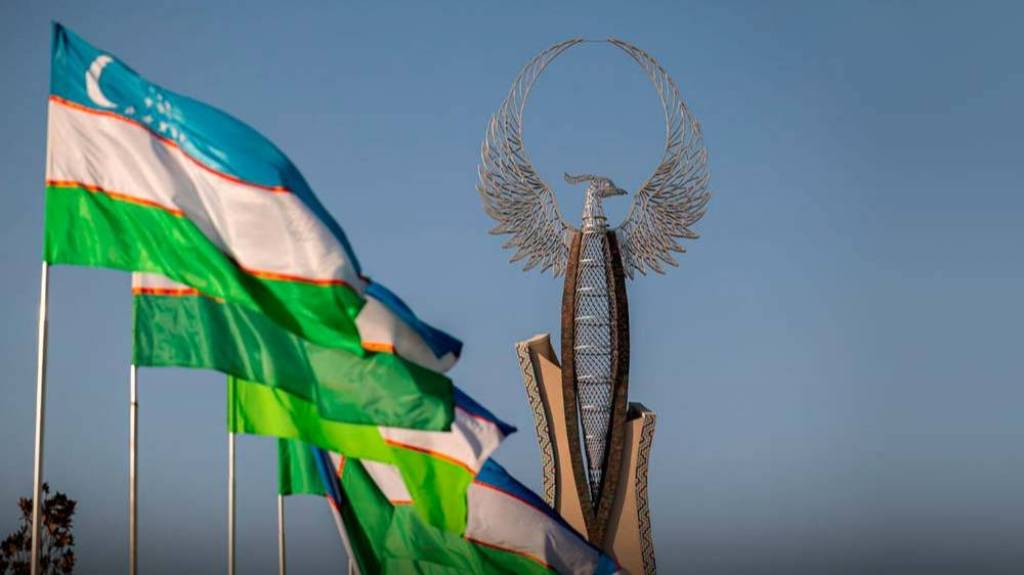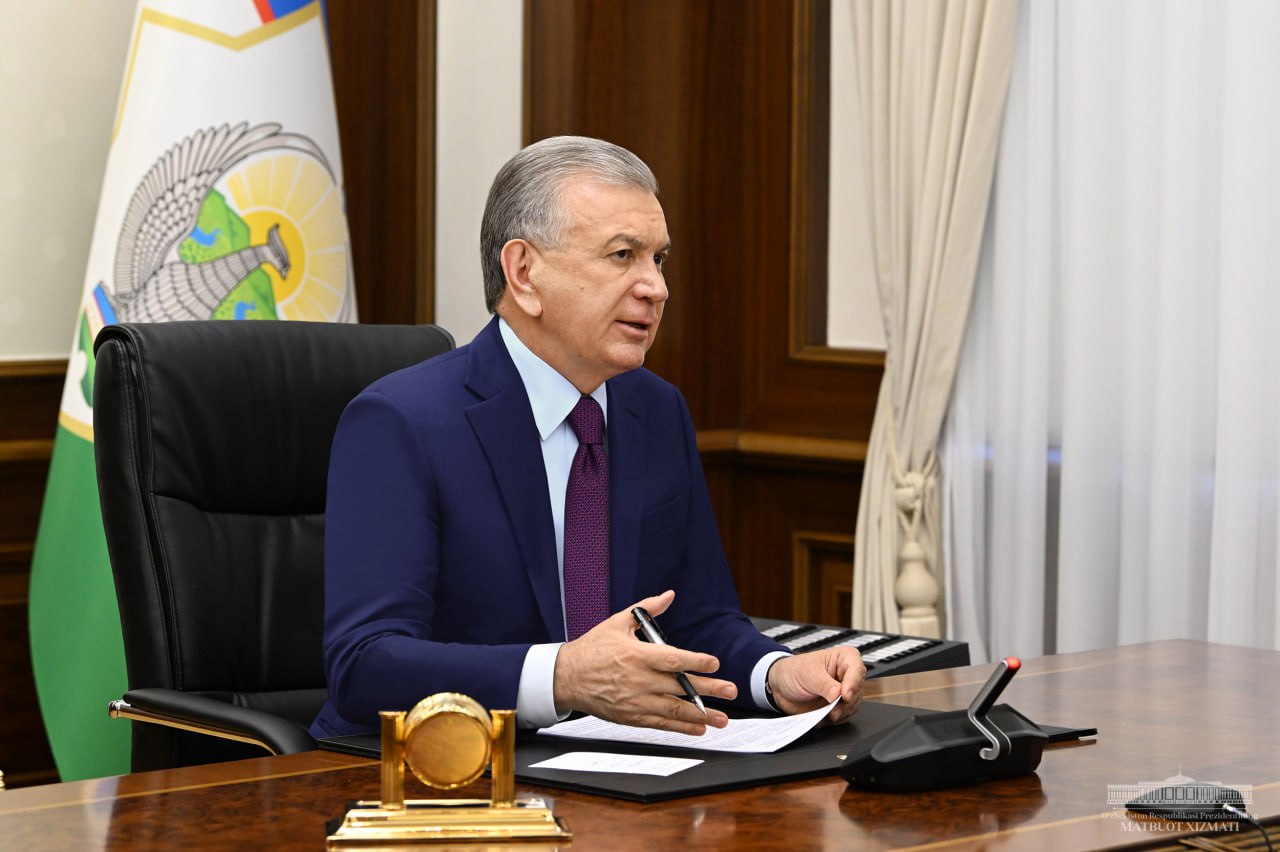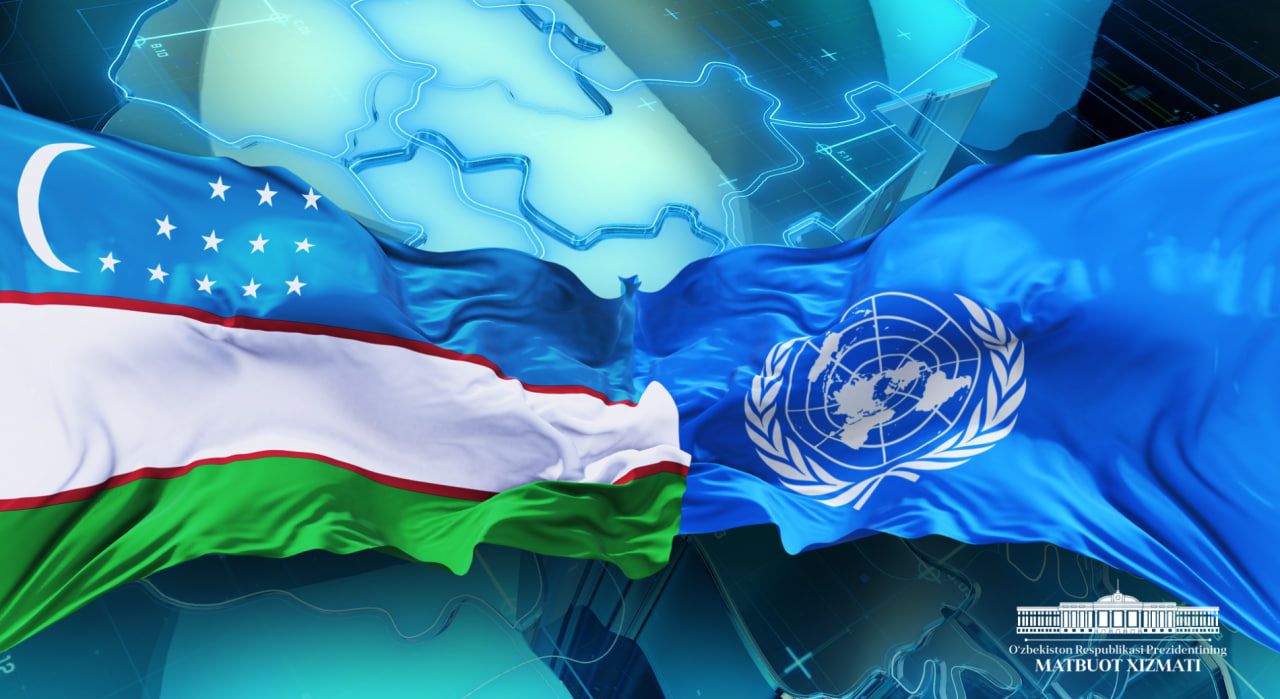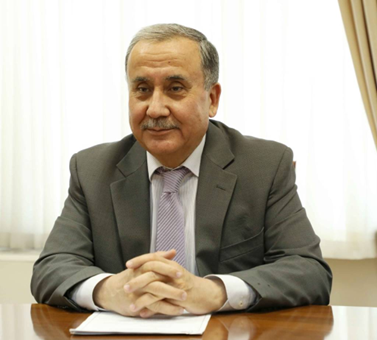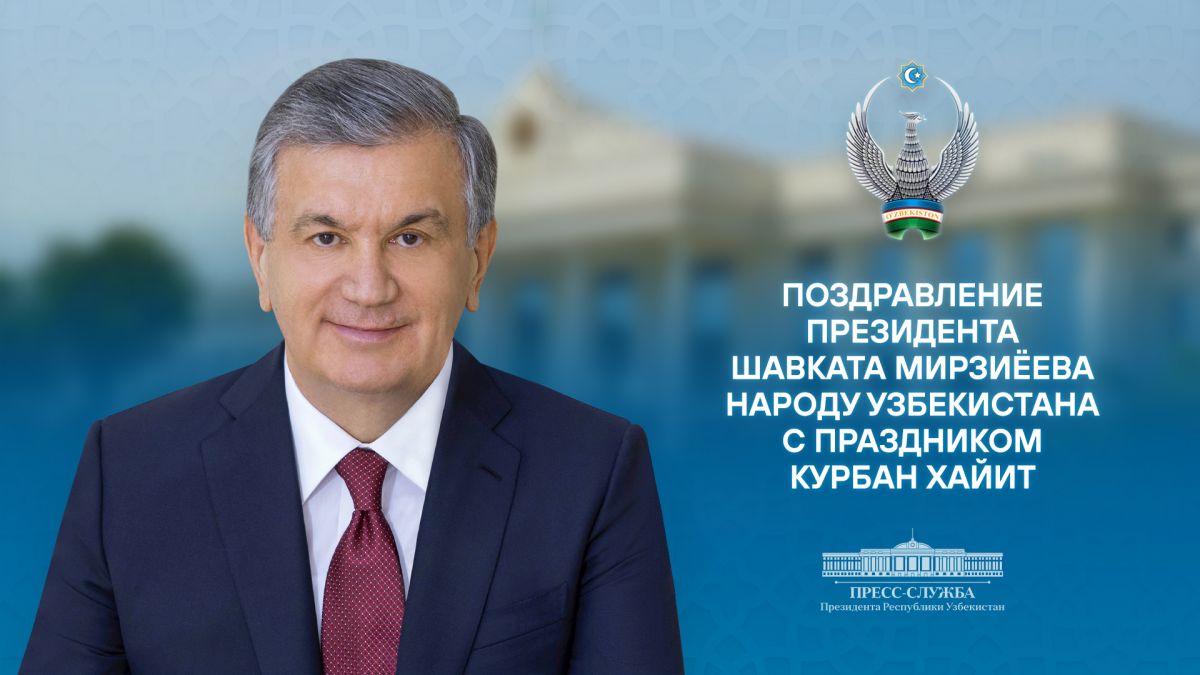Phone
Consular Issues
Phone
Uzbekistan news
We recommend
President of Uzbekistan considers promising areas and projects of cooperation with UAE
📅 30.09.2024
Issues of further development of multifaceted partnership, promotion of economic and investment cooperation projects, establishment of practical interaction in the defense sector were discussed at the meeting between President of the Republic of Uzbekistan Shavkat Mirziyoyev and a delegation from the United Arab Emirates headed by Deputy Prime Minister, Minister of Defense, Crown Prince of the Emirate of Dubai Sheikh Hamdan bin Muhammad Al Maktoum.
The Emirati delegation included the Ministers of Government Affairs Muhammad bin Abdullah Al Gergawi, Energy and Infrastructure Suhail bin Muhammad Al Mazroui, Economy Abdullah bin Tuq Al Marri, and Minister of State for Artificial Intelligence and Digital Economy Omar bin Sultan Al Olama.
At the beginning of the conversation, Sheikh Hamdan Al Maktoum expressed his sincere gratitude to our Head of State for the warm welcome and conveyed warm greetings from UAE President Sheikh Mohammad Al Nahyan and Prime Minister of the UAE, Emir of Dubai Sheikh Mohammad Al Maktoum.
During the meeting, special attention was paid to the issues of forming a new long-term agenda of mutually beneficial cooperation in such key areas as investment, innovative development, green energy, infrastructure, education, healthcare, ecology, digital transformation, tourism and others.
The sides highly appreciated the fruitful results of the joint forum on unlocking the potential of mutually beneficial cooperation, bilateral intergovernmental and interdepartmental talks held this morning.
An agreement was reached to adopt a road map for the development of full-scale cooperation in strategic sectors.
It should be noted that the UAE is one of Uzbekistan's key partners in the Asian region.
The latest high-level contacts took place within the framework of the Global Climate Summit in Dubai last December.
The trade turnover in 2023 grew by 21 percent and amounted to 626 million dollars. More than 320 enterprises with the participation of Emirati capital operate in our country. The portfolio of ongoing and prospective investment projects amounts to about 20 billion dollars.
Festive greetings to the people of Uzbekistan
📅 08.12.2024
Dear compatriots!
I cordially congratulate you, all our multinational people with the Constitution Day of the Republic of Uzbekistan celebrated on December 8.
Undoubtedly, this year we all feel the significance of this holiday especially deeply. After all, above all, it takes place in the context of historic transformations in the political-legal, socio-economic and spiritual spheres of our life.
It should be emphasized once again that the elections to the Oliy Majlis and local Kengashes, held in the spirit of open and competitive contest on October 27 this year, became an important step towards the implementation of our updated Fundamental Law. As a result of the elections, which vividly demonstrated the high political culture, unity and cohesion of our hardworking and tolerant people on the path of building the New Uzbekistan, a new system of representative power has been formed in the country. Its constitutional rights and powers have been strengthened and its responsibility has increased manifold.
One more important aspect: we have moved from the practice of the recent past, when khokims were simultaneously in charge of local councils, to a new system in which, for the first time, councils are headed by chairmen elected among deputies.
The transfer of more than 30 powers of khokims to local councils testifies to an even broader establishment of the principles of democracy in our society.
In accordance with the constitutional provision that the people are the only source of state power, we will resolutely continue our reforms aimed at expanding the powers of the Parliament and local Kengashes, further increasing their activity, creating the necessary conditions for effective activity, in short, turning them into the true voice of the people.
Dear friends!
Large-scale measures are taken in the country for consistent implementation of the priority principles of ensuring human rights, interests and dignity enshrined in the Fundamental Law.
Thanks to the selfless labor of our people, in recent years the national economy has doubled, the per capita income has reached 3 thousand dollars, the poverty rate has decreased from 23 to 11 percent, the coverage of preschool education has exceeded 74 percent, higher education - 39 percent, and this is undoubtedly a historic result.
In order to dynamically continue the reforms, to apply in practice the norms of the Constitution in the new edition, the issues of entrepreneurship development and, on this basis, increasing the population's income, strengthening the atmosphere of mutual respect and harmony in families and mahallas, and comprehensive support for representatives of the older generation, women and youth will continue to be at the center of our attention.
The Fundamental Law stipulates that Uzbekistan is a social state, therefore, further improvement of cities and villages, construction of new residential buildings, health care, education, culture, art and sports institutions, modernization of road and communication networks, strengthening of targeted social protection will be of paramount importance for us. In particular, the priority task is to increase twofold the amount of funds allocated to the health sector, transition to a health insurance system and provide the population with fully guaranteed medical services.
Within the framework of programs in the field of education, we will bring the coverage of higher education to 50 percent in the coming years. In 2025 alone, 4 trillion soums will be allocated from the state budget for the repair of existing kindergartens and construction of new kindergartens and schools.
Another important area is support for those in need of social protection, for which it is planned to allocate a total of 46.5 trillion soums and lift 1 million citizens out of poverty.
We will also raise to a new level the work on creating even more favorable conditions for persons with disabilities, their socialization, and in general on ensuring inclusiveness in society. Necessary measures will also be taken to reform the pension system.
As you know, the new version of the Fundamental Law for the first time enshrines the rights of citizens in the sphere of ecology, emphasizing the state's obligations to protect the environment and maintain the ecological balance.
We have declared 2025 the Year of Environmental Protection and Green Economy in the country and have set clear objectives in this field. I am confident that this will serve as an important basis for implementing the relevant constitutional norms and principles.
I take this opportunity to urge you, dear compatriots, all our people to take an active part in the development and implementation of the State Program of the coming year.
We have no right to forget that the protection of nature is the protection of the humans, our future. We must protect our priceless wealth - fertile fields, clean springs, rivers and lakes, mountains and plains, create new gardens and parks, green territories, so that our motherland Uzbekistan becomes even more beautiful, and future generations live in a free and prosperous country.
Dear compatriots!
Our Constitution has always been and remains a reliable guarantor of strengthening national independence, preserving peace and stability in the country, interethnic friendship and harmony, ensuring the irreversibility of the ongoing reforms.
We are proud of our Fundamental Law - a vivid symbol and practical embodiment of the legal consciousness and will of the people. I believe that studying every article, every norm of this unique legal document, showing respect for them should become a sacred duty and a life principle for all of us.
I am convinced that by working in good faith, recognizing our responsibility, we will be able to further increase the effectiveness of the reforms carried out and will definitely achieve the great goals before us.
Once again I sincerely congratulate you, dear compatriots, with Constitution Day, wish you all health, peace and prosperity to your families.
May the authority and glory of our Motherland grow!
May the people of Uzbekistan - the creator of all our achievements - be happy!
Shavkat Mirziyoyev,
President of the Republic of Uzbekistan
President of Uzbekistan discusses with the head of the European Council the issues of further expansion of multifaceted cooperation
📅 27.01.2025
During a telephone conversation between President of the Republic of Uzbekistan Shavkat Mirziyoyev and President of the European Council António Costa on January 23, topical issues on the bilateral and regional agenda were discussed.
The President of Uzbekistan sincerely congratulated António Costa on his election as the head of the European Council and wished him great success.
It was noted with deep satisfaction that the Uzbek-European multifaceted cooperation has reached the highest level in recent years and continues to develop dynamically in all priority dimensions.
Active contacts and exchanges at different levels have been carried out. In 2024, Uzbekistan's trade turnover with the EU countries exceeded 6 billion euros, the portfolio of projects with European companies reached 30 billion euros.
Last year, an agreement on strategic partnership in the field of critical mineral resources was signed. There is fruitful cooperation in transportation and digital interconnectivity, green economy, culture and other areas.
Confidence was expressed in the early signing of the Enhanced Partnership and Cooperation Agreement between the Republic of Uzbekistan and the European Union, which will give a serious impetus to the development of the entire range of relations.
The Uzbek leader and the head of the European Council also exchanged views on the international agenda and regional cooperation. Joint plans to prepare and hold the first “Central Asia-EU” summit in the city of Samarkand in April this year were discussed.
The President of Uzbekistan held a meeting with the Secretary-General of UN Tourism
📅 15.06.2024
President of the Republic of Uzbekistan Shavkat Mirziyoyev met with Secretary-General of UN Tourism (World Tourism Organization) Zurab Pololikashvili, who is in our country on a working visit, in Samarkand on June 15.
The sides discussed issues related to further expansion of Uzbekistan's multifaceted cooperation with this specialized UN institution.
The course of implementation of agreements reached and initiatives put forward at the 25th session of the organization's General Assembly, which was held in Samarkand in October 2023, has been reviewed. The UN General Assembly's adoption of the resolution initiated by Uzbekistan on declaring 2027 the International Year of Sustainable and Resilient Tourism was highly appreciated.
It was noted with deep satisfaction that the organization is a strategic partner of Uzbekistan in the development of modern tourist infrastructure and popularization of tourist destination to our country.
It was noted the importance of continuing joint efforts to implement programs and projects aimed at creating comfortable conditions and facilities for tourists, development of pilgrimage and cultural and cognitive tourism, including domestic tourism.
Special attention was paid to the issues of training qualified personnel in the field of hospitality and service with the effective use of opportunities of the International Academy of Tourism operating in Samarkand.
In order to popularize the tourist destination in Uzbekistan, practical interaction will be expanded in the issues of supporting the participation of domestic tour operators in major international tourism fairs and exhibitions.
Uzbekistan–2030: Why the National Development Strategy Is Being Updated
📅 06.01.2026
Uzbekistan’s 2030 Strategy is the country’s principal framework for medium- and long-term development. It provides strategic direction for public policy, institutional reform, and socio-economic transformation, while embedding principles of continuity, predictability, and long-term planning at the core of state governance. Since its adoption, the strategy has served as a foundational reference point for the reform agenda, shaping what is often referred to as “New Uzbekistan.”
Over recent years, Uzbekistan has made tangible progress across a wide range of areas, including economic modernisation, public administration reform, judicial reform, the expansion of civic space, and the protection of human rights. These reforms have produced measurable results and have contributed to greater openness and institutional capacity. At the same time, the pace of change—both domestically and globally—has continued to accelerate.
Societal expectations are evolving, economic conditions are becoming more complex, technological change is reshaping governance models, and global geopolitical and economic dynamics are introducing new risks and opportunities. Against this backdrop, updating the Uzbekistan–2030 Strategy is a logical and necessary step to ensure that policy planning remains relevant, responsive, and effective.
At the heart of the revised strategy lies a fundamental principle articulated by the President of Uzbekistan: the state must serve the people, not the other way around. In its updated form, the strategy seeks to translate this principle into practical governance outcomes by reinforcing a development model that is results-oriented, accountable, and centred on human well-being.
Every policy decision and reform priority is assessed through the lens of its impact on citizens’ quality of life, social inclusion, and long-term prosperity. This marks a shift away from abstract targets toward a more outcome-driven approach to public policy.
A key element of the strategy’s refinement is a comprehensive review of progress achieved to date. This includes an honest assessment of remaining challenges and structural bottlenecks, as well as recalibrating performance indicators to enable more precise measurement and evaluation. Each strategic objective is linked to clearly designated responsible institutions, while required financial resources are explicitly identified. This strengthens institutional accountability and moves the strategy from a broad vision to an operational roadmap.
Another defining feature of the updated Uzbekistan–2030 Strategy is its emphasis on clarity and relevance for ordinary citizens. The strategy is being shaped so that people can readily understand how national reforms affect their daily lives—how they improve access to services, create economic opportunities, and enhance prospects for future generations. In this sense, the strategy is intended not as a set of slogans, but as a framework for tangible, lived improvements.
The revised strategy also reflects the need for adaptability. Performance benchmarks are being updated to align with new economic realities, social priorities, technological innovation, and international developments. This ensures that public policy remains flexible and able to respond to change, rather than being constrained by static assumptions.
Digitalisation plays a central role in this process. The monitoring and evaluation of strategy implementation are being fully digitised, enabling greater transparency, evidence-based decision-making, and enhanced public oversight. This approach strengthens trust in public institutions and supports more informed policy adjustments.
Equally important is policy coherence. All sectoral, regional, and thematic development plans are being aligned with the Uzbekistan–2030 Strategy to ensure consistency across government actions. This integrated approach reduces fragmentation and enhances the overall effectiveness of state policy.
Public participation is another core principle. The updated strategy is being developed through broad public consultation, incorporating input from citizens, civil society organisations, experts, and the wider public. This reflects the understanding that reforms are most sustainable and credible when they are shaped with society, rather than imposed upon it.
In conclusion, the ongoing refinement of the Uzbekistan–2030 Strategy represents a structured, transparent, and responsible effort to deepen reforms and adapt them to contemporary realities. Above all, it reaffirms a clear priority: national development is not an end in itself, but a means to improve people's lives and well-being. In this sense, Uzbekistan–2030 is being shaped as a genuinely people-centred roadmap for inclusive and sustainable progress.
Eldor Tulyakov,
Executive Director, Development Strategy Centre
Proposals to improve the quality of education considered
📅 19.06.2024
President Shavkat Mirziyoyev familiarized himself with the proposals on improving the quality of pre-school and school education and the system of professional development of teachers.
Students' interest in subjects and their academic performance largely depend on the knowledge and skill of teachers. Therefore, necessary conditions are being created for teachers' professional development and the system of knowledge assessment is being improved.
The responsible persons reported on the developed proposals in this sphere.
It was noted that a new certification system based on advanced technologies has been introduced. More than 190 thousand teachers took part in it, 51 thousand teachers were promoted to the new category based on the results.
It was emphasized that it is necessary to constantly stimulate the increase in the number of professional and self-educated teachers in schools.
It was proposed to increase the salaries of teachers with the highest and first qualification category from September 2025.
It was instructed to develop and implement a separate professional development program for teachers who have not been certified and do not have sufficient experience.
In this process, it is necessary to make full use of the possibilities of professional development centers and teacher training colleges. To this end, based on the experience of the Presidential Schools, a system of professional development for the heads and teachers of kindergartens and schools will be organized at the Abdullah Avloni National Research Institute with a frequency of every 5 years.
A task has been set to transfer 11 pedagogical colleges in the regions under the authority of the Centers of Professional Development and attract trainers from abroad.
It was informed that kindergartens and schools, technical schools and "Barkamol Avlod" school will be established on the basis of teacher training colleges with low workload.
In order to disseminate best practices, the evaluation system of Presidential Schools was introduced in 500 schools last year. As a result, student achievement in these schools increased from 53 percent to 59 percent. A bonus of up to 40 percent has been set for school leaders and teachers of high-performing schools.
In this regard, starting from the new school year, this evaluation system will be applied in another 1,000 schools. They will be assigned to 182 specialized schools and 500 schools that have tested the system.
Also 270 schools will be equipped with interactive whiteboards, 365 schools will be provided with computer classes.
The presentation also considered a proposal to establish the National Institute of Pedagogy of Education on the basis of the Research Institute of Pedagogical Sciences of Uzbekistan named after Kary-Niyazi. The new institute will be entrusted with the tasks of strengthening makhalla-parents-school cooperation, creating educational literature for parents and children, and scientific research of didactic views of the Jadids. Activity of the Academic Council on 5 specialties will be organized, as well as training of personnel in master's and doctoral studies.
In addition, the issues of introducing international methods in the schools of sportsmanship of Bakhodir Jalolov and Oksana Chusovitina, improving the quality of education and training were touched upon.
The head of state gave instructions on improving the quality of teachers' training, organizing a fair system of evaluation and incentives.
Bringing Markets and Capital Together: The Uzbekistan–Türkiye Economic Union
📅 28.01.2026
Over the past eight years, relations between Uzbekistan and Türkiye have undergone a profound qualitative transformation, evolving from traditionally friendly ties into a full-fledged strategic partnership with a strong economic, investment, and industrial dimension. While the period prior to 2017 was largely characterized by inertia, the launch of large-scale reforms in Uzbekistan marked a decisive shift in bilateral relations toward practical cooperation focused on trade, investment, and joint manufacturing.
A key role in this transformation has been played by the political will and personal engagement of the leaders of both countries - President of the Republic of Uzbekistan Shavkat Mirziyoyev and President of the Republic of Türkiye Recep Tayyip Erdoğan. Regular high-level dialogue has provided Uzbek-Turkish relations with stability, strategic coherence, and a long-term economic horizon.
Political Foundations as a Driver of Economic Convergence
Diplomatic relations between the two countries were established in 1992; however, a turning point came in October 2017 with the signing of the Joint Declaration on Strategic Partnership in Ankara. This step laid a solid institutional foundation for the rapid expansion of trade, economic, and investment cooperation.
In 2018, the High-Level Strategic Cooperation Council was established in Tashkent under the co-chairmanship of the two presidents. Its meetings in 2020, 2022, and 2024 became key platforms for aligning priorities in trade, investment, industry, transport, and interregional cooperation. Over time, political dialogue has evolved from declarative engagement into a practical instrument supporting concrete economic initiatives and project-based decisions.
Trade: Scale, Structure and Institutional Incentives
Türkiye is firmly among Uzbekistan’s largest trading partners. In 2020, bilateral trade turnover amounted to USD 2.1 billion, reaching USD 3.02 billion by the end of 2025.
Uzbekistan’s exports to Türkiye are predominantly industrial in nature, comprising non-ferrous metals and metal products, textiles, services, plastics, and food products. Imports from Türkiye consist mainly of mechanical and electrical equipment, chemical products, textiles, pharmaceuticals, and metal structures, reflecting Türkiye’s role as a key source of industrial technologies and equipment.
A significant qualitative step forward was the signing of the Preferential Trade Agreement in 2022, which entered into force in 2023. In 2025, the parties began expanding the list of goods covered by preferential treatment, creating additional incentives for trade diversification and deeper industrial cooperation.
Investment Cooperation: From Presence to Systemic Engagement
Investment cooperation is one of the most dynamically developing areas of bilateral relations. In 2024, the volume of Turkish investments utilized in Uzbekistan reached USD 2.2 billion, while in January-November 2025 it increased to USD 3.2 billion. A total of 2,137 enterprises with Turkish capital operate in Uzbekistan, including 496 joint ventures and 1,641 wholly Turkish-owned companies.
These enterprises are active in textiles and furniture manufacturing, construction, trade, transport, logistics, and services. Importantly, a substantial share of them is export-oriented, strengthening Uzbekistan’s integration into regional and global value chains.
Industrial Cooperation: Transition to Joint Manufacturing
In recent years, Uzbek–Turkish cooperation has increasingly shifted from traditional trade toward industrial partnership. Turkish companies are actively involved in establishing production facilities across Uzbekistan’s regions, introducing modern technologies, management standards, and export-oriented business models.
Regular meetings of the Intergovernmental Commission on Trade and Economic Cooperation, accompanied by business forums, result in detailed roadmaps comprising dozens of measures covering industry, energy, logistics, and regional projects. This approach forms a solid foundation for sustainable industrial partnership.
Interregional Cooperation: Localized Economic Engagement
Active interregional interaction has become an essential element of the new partnership model. In 2024, targeted visits by delegations from the Fergana, Khorezm, Namangan, Navoi, Samarkand, and Jizzakh regions, as well as the city of Tashkent, were held to various regions of Türkiye.
This format enables a shift from framework agreements to concrete investment projects, creates direct B2B and B2G communication channels, and contributes to a more decentralized and resilient architecture of cooperation.
Transport and Logistics as Pillars of Trade and Investment
The expansion of trade and industrial cooperation naturally increases the importance of transport and logistics interaction. Türkiye is viewed by Uzbekistan as a key logistical gateway to European and Mediterranean markets, while Uzbekistan is becoming an important hub for Türkiye’s access to Central Asia.
The development of rail and road transport, along with intensive air connectivity - up to 97 regular flights per week across eight routes - enhances business mobility, supports investment activity, and strengthens economic integration between the two countries.
Prospective Areas of Cooperation: Converging Interests
The established economic core of Uzbek–Turkish relations provides a basis for a new phase of cooperation, shifting from quantitative growth to deeper structural and technological integration.
Localization and joint development of industrial production remain key convergence points. Uzbekistan offers industrial zones, resources, and a growing domestic market, while Türkiye contributes technology, design, managerial expertise, and access to external markets.
The textile and light industry is evolving toward the production of finished branded goods and contract manufacturing for international retail chains. Mechanical engineering and electrical equipment sectors are creating prerequisites for the establishment of assembly and production facilities. The agro-industrial complex offers opportunities for deep processing and joint exports of food products.
A separate strategic direction is the joint entry into third-country markets, where the combination of Uzbekistan’s production potential and Türkiye’s trade and logistics infrastructure creates substantial competitive advantages.
Overall, over the past eight years Uzbekistan and Türkiye have built a resilient model of strategic partnership based on trade, investment, industrial cooperation, interregional engagement, and transport connectivity. Trade turnover exceeding USD 3 billion, multi-billion-dollar investments, and thousands of joint enterprises testify to the maturity and long-term nature of bilateral relations.
Mashrab Mamirov,
Head of Directorate General of the Ministry of Investment, Industry and Trade of the Republic of UzbekistanRELIGIOUS TOLERANCE AND INTERFAITH HARMONY IN UZBEKISTAN
📅 06.11.2025
The declaration of independence and the commitment of the Government of Uzbekistan to the ideals of democracy, the choice of a secular path of development of society have gradually made it possible to create equal legal conditions for the existence of religions in general and religious groups in particular.
In the religious sphere, this large-scale work is carried out by the relevant state bodies and civil society institutions and is aimed at ensuring citizens' constitutionally guaranteed right to freedom of conscience; strengthening religious pluralism, tolerance and interfaith dialogue.
One of the significant results of joint work is the adoption in December 2018 by the UN General Assembly of a special resolution "Enlightenment and Religious Tolerance".
The adoption of the resolution was a practical implementation of the initiative of the President of the Republic of Uzbekistan Shavkat Mirziyoyev, put forward at the 72nd session of the UN General Assembly. The main goal of the proposed resolution is "to ensure universal access to education, the elimination of illiteracy and ignorance."
It is noteworthy that the resolution was not only unanimously supported by all UN member states, but also adopted with the co-authorship of over 50 countries. This testifies to the high recognition by the international community of the relevance and timeliness of the initiative of the President of Uzbekistan.
In recent years, significant changes have taken place in Uzbekistan and large-scale reforms have been implemented in many areas, including in the religious and educational sphere.
A number of legislative acts have been adopted aimed at further improving activities in the religious sphere.
In order to deepen the study of Islam and teach its scientific foundations, the International Islamic Academy of Uzbekistan was created. The Academy specializes in teaching secular and religious knowledge, training qualified personnel in the interpretation of the Koran, Islamic law, religious dogmas and hadiths.
In Uzbekistan, unique mechanisms are used to revive national and religious values, study and promote the rich scientific and spiritual heritage of great ancestors, and strengthen religious tolerance in society. The activities of the Center for Islamic Civilization, international research centers of Imam Bukhari, Imam Termizi, Imam Maturidi, Bahauddin Naqshbandi have been established.
As a result of large-scale reforms and transformations carried out in the religious sphere, the Higher Madrasah Mir Arab in Bukhara, the School of Hadith Studies in Samarkand, the Madrasah of Imam Termizi and the Islamic Institute named after Imam Termizi in Termez began their activities.
In addition, the Charitable Public Fund "Vakf" was established under the Office of Muslims of Uzbekistan, whose tasks include financing work on the reconstruction of mosques, holy places of pilgrimage and visits, other objects, providing material and technical support and providing material support to employees in this field. The Fund received the opportunity to dispose of funds coming to 3 accounts: charitable, vakf and zakat (ushr, fidya, fitr).
In accordance with the adopted legislative acts, in order to further improve the activities of the Committee on Religious Affairs, a new composition of the Council for Religious Affairs has been approved, which is a public advisory body under the Committee.
The activities of the Council are inextricably linked with ensuring freedom of religion in the country, respecting the rights of religious organizations and believers. The initiatives of the members of the Council are fully implemented within the framework of measures taken by the country's leadership in the field of protecting and further strengthening the rights and freedoms of religious movements.
The significance and timeliness of the measures taken by the country's leadership served as the basis for holding the international forum "Dialogue of Declarations" in Tashkent, Samarkand and Bukhara on May 16-20, 2022. This event was part of the systematic and consistent efforts of Uzbekistan to practically implement the principles and provisions enshrined in the Special Resolution of the UN General Assembly "Enlightenment and Religious Tolerance", adopted in 2018 on the initiative of President Shavkat Mirziyoyev.
It is especially worth noting that at the past 76th session of the UN General Assembly, the "Bukhara Declaration" adopted following the results of this forum was recognized as an official UN document. As an official UN document, the document has been translated into 6 languages and distributed among the UN member states, as well as specialized agencies of the organization.
The second round of the international forum will be held on September 10-13, 2025 with the assistance of several NGOs from the USA. The participants of the event also visited Samarkand, where they got acquainted with the activities of the reconstructed complex of Imam Bukhari.
Uzbekistan has special dates that are closely related to the religious life of believers: these are "Day of Friendship of Peoples", celebrated on July 30, and "International Day of Tolerance", celebrated on November 16. Both of these dates are marked not only by holding events, but also by awarding the corresponding badges - the badge "Khalklar dustligi" ("Friendship of Peoples") has been awarded since 2021, and the badge "Diniy bagrikenklik" ("Religious Tolerance") began to be awarded to distinguished citizens since 2023. Among the awardees are representatives of various religious denominations of Uzbekistan.
At the same time, Uzbekistan attaches great importance to the preservation of religious and spiritual heritage, the enrichment of existing funds, the creation of necessary conditions for local and foreign researchers to work with historical sources, and the comprehensive study of historical and cultural heritage.
Today, in the country, in order to ensure interethnic and interfaith harmony in society, a legislative framework has been created that provides for the observance of the rights and legitimate interests of citizens.
The Constitution of the Republic of Uzbekistan enshrines the norm on freedom of religion for every person. Attention is also paid to improving and liberalizing national legislation in the field of religion. The procedures for obtaining permission for the production, import and distribution of religious literature have been simplified. The procedure for state registration of religious organizations has been further optimized.
Currently, the new Law "On Freedom of Conscience and Religious Organizations" is in force, which contributes to ensuring the constitutional rights of citizens of the country to freedom of conscience and religion.
Noting the fundamental innovations in the Law as a consistent continuation of large-scale reforms in the religious and educational sphere, special attention should be paid, first of all, to the creation of favorable conditions for ensuring freedom of conscience for every person, and clarifying law enforcement practice.
Currently, 2373 religious organizations of 16 religious denominations operate in Uzbekistan. Of these, Muslim organizations - 2174, which is 92 percent of the total number.
There are also 181 Christian organizations, 8 Jewish communities, 7 Baha'i communities, one Krishna society and one Buddhist temple, as well as the interfaith Biblical Society of Uzbekistan operating in Uzbekistan.
Recently, 134 religious organizations have been registered in Uzbekistan, including 3 higher and one secondary specialized Islamic educational institutions in Bukhara, Samarkand and Termez, 105 mosques and 25 non-Islamic organizations of 7 different religious denominations.
At the same time, the national legislation of Uzbekistan does not provide for any restrictions on the number of religious organizations or the terms of their registration.
Religious organizations operating in the republic, along with other public organizations, actively participate in spiritual and educational work, make a significant contribution to improving the spirituality of society, and forming strong beliefs in young people based on patriotism, as well as interfaith and interethnic tolerance.
It should be noted that religious policy in Uzbekistan is based on the principles of the secular nature of the state, religious tolerance and equal treatment of all religions. In the republic, representatives of various nations and ethnic groups professing Islam, Christianity, Buddhism, Judaism and other religions carry out their activities on equal terms.
All conditions have been created for adherents of each denomination, allowing them to freely and unhindered practice their religion.
Believers freely pray in mosques, churches, synagogues, observe fasting, and also make pilgrimages. Religious organizations have the right to own territory, publish literature, train their religious ministers, and organize pilgrimages to holy places.
The freedom of religion guaranteed by the national legislation of Uzbekistan has created all the necessary conditions for meeting the religious needs of all citizens - representatives of 136 national and ethnic groups.
Representatives of different faiths freely celebrate all religious holidays. Thus, from year to year, Kurban-Hayit and Ramadan-Hayit are celebrated on an increasingly large scale among Muslims, Easter and Christmas - among Christians, Pesach, Purim and Hanukkah - among Jews, Navruz - among Baha'is, as well as celebrations dedicated to Buddha and Krishna and other major events.
Believers make pilgrimages to holy places: Muslims to Saudi Arabia to perform the Hajj and Umrah rituals, Christians - to Russia, Greece and Israel, Jews - to Israel.
Over the years of independence, more than 484 thousand Muslims have made pilgrimages to Saudi Arabia, including 188 thousand - Hajj and 296 thousand - Umrah, more than 3.2 thousand Christians and Jews have visited religious shrines in Israel, Russia, Turkey, Italy, Georgia, Greece.
To meet the spiritual needs of society, a large number of religious literature of various orientations is published annually. To fully cover the religious life of Uzbekistan, a number of newspapers and magazines are published, including the newspapers "Islom nuri", "Slovo zhizni", the magazines "Khidoyat", "Vostok svyshe".
Today, in Uzbekistan, on a systematic basis, a set of measures is being carried out to protect the population from the negative influence of destructive ideas that reflect radical extremist ideology and religious fanaticism.
An important step in this direction was the application of acts of pardon. In particular, since 2017, 29 decrees of the President of the Republic of Uzbekistan have been adopted on pardoning persons who have committed crimes.
It should be noted that in recent years, within the framework of the consistent policy pursued in Uzbekistan in the field of protecting the rights and freedoms of citizens, special attention is paid to measures aimed at protecting the rights, freedoms, honor and dignity not only of citizens residing in the republic, but also of our compatriots who find themselves in difficult life situations in foreign countries.
Unfortunately, some of our citizens, who have fallen under the influence of alien ideas, believing false promises, in different years joined the ranks of international terrorist organizations in armed conflict zones abroad. Spouses, fathers of some women returned as part of humanitarian operations, died in the course of armed clashes.
Given this circumstance, on the instructions of the President of Uzbekistan, five humanitarian actions "Mehr" were successfully carried out in 2019-2021, within the framework of which more than 500 citizens of the republic, mainly women and children, were returned to their homeland from the zones of armed conflicts in the Middle East and in Afghanistan.
In order to further assist in their speedy reintegration and rehabilitation, a set of measures has been implemented at the state level to provide timely medical, psychological, material and moral assistance. To date, all returnees have been provided with the necessary conditions for their adaptation to peaceful life and integration into society, access to educational and other social programs has been provided, including through the provision of housing and employment.
In general, it is worth noting that an important distinguishing feature of the religious life of modern Uzbekistan is the inadmissibility of establishing advantages or restrictions for one religion in relation to other denominations.
One of the main priorities of reforming society in order to ensure interethnic harmony and religious tolerance is to ensure and protect the rights and freedoms of citizens, their equality before the law regardless of race, gender, nationality, language, social origin, beliefs, religion, personal and social status, which are enshrined in the Constitution of Uzbekistan.
Uzbekistan consistently and steadily fulfills its international obligations in the field of ensuring religious freedoms within the framework of international human rights treaties.
As is known, Uzbekistan has acceded to more than 70 major international human rights instruments. Accession to these documents contributed to the creation of an effective human rights protection system in Uzbekistan.
It is important that Uzbekistan's policy in the field of religion, aimed at strengthening interfaith dialogue and religious tolerance in society, is an important factor of stability and security.
In conclusion, I would like to emphasize that the large-scale reforms being carried out in the country are a clear confirmation of the consistent continuation by the President of the Republic of Uzbekistan of the implementation of the principle "Everything in the name of man, in the name of his future."
Committee on Religious Affairs
The President signed into law a law affecting the lives of more than 10 million people
📅 07.08.2024
President Shavkat Mirziyoyev signed the law "On Recognition of Rights to Unauthorized Land Plots and Buildings and Structures Constructed on Them".
Many citizens of our country have been waiting for the resolution of this issue, which concerns the lives of millions of families. According to preliminary data, there are currently more than 3 million 600 thousand land plots, the legal documents for which are not formalized or incomplete.
In this regard, the head of state at a video conference call on land registration and cadastre held on November 21, 2023, noted the need for a legal solution to this issue. Accordingly, a draft law was developed with the participation of specialists in the sphere and deputies. The positive experience of Italy, Bulgaria, Croatia, the Czech Republic and other countries was taken into account. The draft was finalized and considered in the chambers of the Oliy Majlis.
The law consists of 6 chapters and 35 articles, which recognize rights to the following land plots and property:
1) land plots unauthorizedly seized by citizens before May 1, 2018 through the construction of individual housing, and buildings and structures built on them;
2) land plots occupied by citizens and organizations before May 1, 2018 in excess of the area specified in the document, as well as buildings and structures built on them;
3) land plots, the recognition of rights to which within the framework of the "one-time action" has not been completed, as well as buildings and structures constructed on them;
4) land plots allocated by decision of the regional (city) khokim until June 8, 2021, but not approved by the regional khokim or the Kengash of People's Deputies;
5) residential premises on the territory of horticultural and vine-growing associations and the land plot occupied by them;
6) land plots of entrepreneurs located in small industrial zones before March 9, 2020;
7) land plots occupied by buildings and houses privatized by state warrant;
8) land plots occupied by buildings and houses for which the ownership right has been recognized by the decision of the hokim.
The law also clearly defines the main conditions for recognizing rights. For example, the land plot should not be allocated to other persons or put up for auction; there should be no dispute over the land plot; there should be no contradiction with the general plan.
Recognition of rights is carried out step by step by region. Approval of information and documents concerning unauthorized land plots and buildings and structures built on them is carried out through the automated information system of the Cadastre Agency. The relevant information is also entered into this system by 15 authorized organizations.
Completeness and legality of the collected documents are checked by the regional justice department. The results will be announced on the website of the Cadastre Agency and in makhalla corners. Citizens who have received a positive conclusion will be sent an SMS-message, on the basis of which a one-time payment will be made. After that, the rights will be recognized quarterly by the decision of the regional Kengash of People's Deputies.
The bodies of prosecutor's office, internal affairs, agro-inspection, ecology, cadastre establish state control over the implementation of the law. The law also pays special attention to public control. Thus, public groups will be created in each mahalla by decision of district councils of people's deputies. These groups will include a deputy of the district council elected from the district where the mahalla is located, the chairman of the mahalla and active citizens.
A one-time payment is charged for the recognition of rights to land plots under residential houses, privatized or buildings and structures recognized on the right of ownership. The amount of the payment is 5 basic calculation units in the city of Tashkent, 3 BRV in the city of Nukus and regional centers, 2 BRV in cities and 1 BRV in other settlements. Persons included in the Unified Register of Social Protection and persons with disabilities are given a discount.
The one-time payment is directed to cover the costs of the cadastre and justice bodies and the Uzbekcosmos Agency. The remaining funds will be directed to the activities of the initiative budget, i.e. to the mahallas.
The law will come into force in 3 months, before that explanatory and preparatory work will be carried out on the ground. The law will be in force until January 1, 2028.
It should be noted that in the Republic of Karakalpakstan work in this direction has already begun. The Decree of the President of Uzbekistan of July 28, 2023 allowed to recognize the rights to undocumented residential houses and land plots located in the region by the decision of Jokargy Kenes of the Republic of Karakalpakstan.
After that, working groups were established in all districts and cities to examine 43,432 houses built in the Republic of Karakalpakstan without title documents. The location, condition and time of construction of the houses were verified on the basis of an analysis of land records and space images.
Following a comprehensive discussion, ownership of 27,590 residential houses and the right to lease the land on which they are located were recognized.
The results of this noble policy have had a positive impact on the lives of more than 100,000 citizens living in 27,590 houses. They now have the right to legally register their housing, sell it to another person, and put family members on permanent registration. Also, owners will now be able to receive preferential loans for repairs or additional construction, and in case of seizure of housing for public needs to demand compensation in accordance with the law.
The law "On Recognition of Rights to Unauthorized Land Plots and Buildings and Structures Constructed on Them" will expand the scope of this noble work throughout the country. If we assume that each of more than 3 million 600 thousand land plots concerns on average 3-4 citizens or entrepreneurs, this law will solve the problems of more than 10 million people and create a legal basis for their future life.
UN Secretary-General to visit Uzbekistan
📅 30.06.2024
At the invitation of President of the Republic of Uzbekistan Shavkat Mirziyoyev, United Nations Secretary-General António Guterres will pay an official visit to our country from June 30 to July 1.
The program of the high-ranking guest's stay in Tashkent envisages talks at the highest level.
The agenda includes issues of further expansion and strengthening of Uzbekistan's multifaceted cooperation with the UN and its institutions, as well as topical aspects of global policy and regional interaction. Special attention will be paid to supporting measures to achieve the Sustainable Development Goals in our country.
During the visit, the UN Secretary-General will also visit a number of industrial and social sites, hold bilateral meetings and events.
Translated with DeepL.com (free version)
Uzbekistan’s Priorities in the Organization of Turkic States: A Factor Ensuring Sustainable Development of Turkic Countries
📅 08.10.2025
The evolution of the Organization of Turkic States (OTS) has attracted particular attention from the international expert community, especially in the context of sustainable development, where Uzbekistan’s accession in 2019 became a catalyst for creating new opportunities for joint progress among Turkic countries.
Originally established on October 3, 2009, as the Cooperation Council of Turkic-Speaking States, the organization has undergone significant institutional evolution and was officially renamed the Organization of Turkic States at the 8th Summit in Istanbul on November 12, 2021. This decision reflected not only the deepening interaction among member states but also their shared aspiration to develop a collective approach to contemporary risks and challenges related to the sustainable development of the Turkic world—a role in which Uzbekistan soon assumed a prominent position.
Uzbekistan’s policy within the OTS has been primarily manifested in the economic sphere, where deeper integration has become not only a sign of growing mutual trust but also a practical foundation for jointly ensuring stability and sustainable development.
By 2024, mutual trade among OTS member states exceeded $45 billion, and the combined GDP of the five member states reached $1.9 trillion, demonstrating increasing economic interdependence. According to data from the Center for Economic Research and Reforms (CERR), Uzbekistan’s trade turnover with OTS countries grew from $3.34 billion in 2016 to $9.4 billion in 2023, reaching $10 billion by 2024—nearly triple the figure from seven years earlier.
This dynamic growth in economic ties has not only strengthened mutual interest among OTS countries in regional stability but also laid a solid foundation for a new approach to security—one actively promoted by Uzbekistan in its foreign policy.
An analysis of initiatives put forward by President of Uzbekistan Shavkat Mirziyoyev at OTS summits confirms Tashkent’s consistent and systematic approach to strengthening regional security. In place of the traditional military-political dimension, Uzbekistan advocates a model in which security is understood as the outcome of sustainable development, interconnectedness, and long-term, structured cooperation.
This approach is embodied in the following strategic directions, covering key aspects of contemporary security:
First, Uzbekistan was among the first in the region to propose cooperation in responding to systemic threats. During the COVID-19 pandemic (April 2020), Tashkent proposed establishing a permanent mechanism for epidemiological surveillance, a coordination group under the OTS Secretariat, and partnership arrangements with the World Health Organization (WHO).
Following the earthquake in Türkiye (March 2023), Tashkent initiated the creation of an OTS platform for practical cooperation on disaster prevention and response, as well as the development of a multilateral agreement on risk reduction and the establishment of a Natural Disaster Monitoring Center in Tashkent.
All these measures aim at early warning, reducing vulnerability, and enhancing collective resilience—key elements of preventive security.
Second, Uzbekistan advances sustainable development through deeper economic interconnectivity.
In transport, Uzbekistan proposed joint use of the multimodal corridor “Tashkent–Karakalpakstan–Aktau–Baku–Tbilisi–Kars–Istanbul,” implementation of a “single window” system and “green corridors” along the Trans-Caspian route, and full digitalization of road transport through the eTIR system. In 2022, Uzbekistan and Azerbaijan became the first countries to successfully carry out a transport operation using electronic eTIR carnets.
In food security, Uzbekistan proposed developing a multilateral agreement on supply systems and cooperation with the Food and Agriculture Organization (FAO).
In the environmental sphere, Tashkent proposed establishing a Turkic environmental protection body headquartered in the Aral Sea region, forming an Environmental Council, and adopting a “Turkic Green Energy Transition” concept.
All these initiatives create an infrastructure-economic foundation for security, reducing dependence on external shocks and strengthening regional autonomy.
Third, Tashkent’s key contribution lies in promoting the institutionalization of the OTS. At the Samarkand Summit (November 2022), Uzbekistan proposed creating dedicated ministerial-level committees on energy, IT, healthcare, and other sectors.
Later, Uzbekistan initiated hosting the headquarters of strategically important OTS bodies in Tashkent, including the Emergency Response Center, the Council of Railway Administrations, the Turkic Investment Bank, the Research Center for Human Capital Development, and the Academy of Space Research.
During Uzbekistan’s OTS Chairmanship (2022–2023), over 100 events were held, and new cooperation platforms were established, including the Organization of Trade Unions of Turkic States and the Institute for Drought Prevention.
These measures enhance joint preparedness and rapid response capabilities to contemporary challenges, strengthen trust among member states, and support sustainable development.
Fourth, alongside deepening cooperation in humanitarian, economic, and legal spheres, Uzbekistan consistently develops avenues of interaction related to coordinating responses to threats to regional stability.
For example, at the Shusha Summit in July 2024, Uzbekistan proposed formulating unified OTS approaches to the Afghan issue in light of the new regional realities. Such initiatives reflect Tashkent’s commitment to consolidating foreign policy positions and developing a coordinated strategy on the most sensitive issues of regional stability.
Thus, Uzbekistan’s initiatives within the OTS form a comprehensive, prevention-oriented model of sustainable development, in which humanitarian, economic, environmental, and political components are viewed as interdependent. Tashkent’s approach not only aligns with current trends in international relations but also creates conditions for strengthening the strategic autonomy of the Turkic world amid global fragmentation.
However, it should be noted that this model is not developed in isolation. On the contrary, it is organically complemented by the OTS’s external openness and its aspiration to integrate into the international architecture of relations through cooperation with key global and regional institutions. This helps avoid duplication, enhances the legitimacy of OTS initiatives, and aligns them with international standards.
In this process, Uzbekistan plays a significant role by consistently promoting synergy between the OTS and multilateral platforms, particularly in epidemiological, environmental, and humanitarian areas.
The OTS maintains especially close cooperation with the United Nations and its specialized agencies. Uzbekistan’s 2021 initiative to establish a Turkic environmental body under UN auspices, headquartered in the Aral Sea region, directly integrates regional efforts into the global environmental agenda.
Proposals for cooperation with the UN Food and Agriculture Organization (FAO) (2022) and collaboration with the World Health Organization (WHO) (2020) further demonstrate the desire to leverage the UN’s expertise and institutional capacity to implement homegrown security mechanisms.
Additionally, Tashkent initiated partnerships with the UN Office for Disaster Risk Reduction (UNDRR) and the Global Facility for Disaster Reduction and Recovery (GFDRR) in the context of establishing the Natural Disaster Monitoring Center (2023), underscoring the OTS’s commitment to the principles of sustainable development and preventive security enshrined in the UN 2030 Agenda.
Simultaneously, the OTS is expanding its international presence: in 2024, the organization obtained observer status in the Economic Cooperation Organization (ECO), submitted similar applications to the UN and the Organization of Islamic Cooperation (OIC), and strengthened ties with the EU and OSCE through its European office in Budapest. At the Budapest Informal Summit (May 2025)—the first ever organized by an observer country—the Budapest Declaration was adopted, reaffirming the OTS’s commitment to combating terrorism, cyber threats, and organized crime.
This foreign policy orientation is also confirmed by assessments from international analytical circles.
According to an analytical report by the Global Security Research Center at the Geneva Centre for Security Policy (GCSP), the OTS demonstrates a unique model of regional cooperation that combines cultural identity with pragmatic measures to reduce vulnerability to transboundary threats. Experts from the “AIR Center” (Azerbaijan) note that for Central Asian countries and Azerbaijan, the OTS has become a strategic shield against external threats and a platform for asserting independence.
Thus, the OTS not only strengthens the collective resilience of its member states to external challenges but also creates a space for developing joint approaches to implementing projects aimed at the sustainable development of Turkic countries.
In this regard, Uzbekistan consistently promotes a comprehensive, prevention-oriented model for addressing risks and factors undermining sustainable development, in which traditional threats are complemented by non-traditional challenges—from pandemics and natural disasters to destructive ideologies. Particular emphasis is placed on building trust through humanitarian diplomacy, youth initiatives, cultural rapprochement, and institutional cooperation.
In the context of regional stability, Uzbekistan advocates for unified approaches to the Afghan issue, supports counter-terrorism and anti-organized crime efforts, and initiates mechanisms for collective crisis response.
The adoption of the Charter of Turkic Peace at the 11th OTS Summit in Bishkek, along with President Shavkat Mirziyoyev’s proposal at the same forum to sign a Treaty on Strategic Partnership, Eternal Friendship, and Brotherhood among Turkic States, became pivotal factors in shaping a long-term architecture of trust and shared responsibility.
Overall, Uzbekistan’s initiatives within the OTS represent a comprehensive strategy aimed at creating an alternative model for ensuring sustainable regional development, grounded in the cultural-historical commonality and economic interconnectedness of Turkic countries.
Alisher Kadyrov,
the head of the Department of the Institute for Strategic and Interregional Studies under the President of the Republic of UzbekistanCongratulations to the people of Uzbekistan on Kurban Hayit holiday
📅 15.06.2024
Dear compatriots!
Sincerely, from the bottom of my heart, I congratulate you, all our people on the holiday of Kurban Hayit, which has come in our country, which is being transformed and illuminated with the light of peace, kindness and harmony every day.
In these blessed moments we all deeply feel the spirit and joy of the great holiday and give immense gratitude to the Almighty for the fact that we meet such bright days together with our people.
Today, Kurban Hayit, firmly established in people's lives as a symbol of mercy, generosity and humanism, is gaining more and more significance, consonant with the content of large-scale reforms in the New Uzbekistan, in which respect for human honor and dignity comes to the fore in all spheres.
It should be especially noted that our sacred religion and this bright holiday, which embodies its humanistic essence, serves as a source of strength and inspiration for us in all good deeds aimed at strengthening the atmosphere of peace and tranquility, friendship and cohesion in mahallas and families, caring for the older generation, youth and women, low-income families, and making sure that no one is left behind.
Dear friends!
In these bright days, when our hearts are filled with joy, we talk about the great work carried out in recent years to revive the original spiritual values, to improve the sacred places, to create favorable conditions for the Muslims of the country to freely perform religious rites, including hajj and umrah.
In a short period of time, international scientific centers of Imam Bukhari, Imam Termezi and Imam Maturidi have been organized. The memorial complexes of Abu Iso Termezi, Abu Muin Nasafi, Sulton Uwais Karani and Suzuk Ota have been radically transformed. Work on the construction and equipping of the Imam Bukhari memorial complex and the Centre for Islamic Civilization is continuing apace. Majestic mosques are being built in many towns and villages.
Over the past seven years, more than 60 thousand Muslims of the country have made the Hajj. These days 15 thousand more of our compatriots are making pilgrimage to two sacred cities - Mecca and Medina, having realized their most cherished dream.
In such blessed moments, when good thoughts come true, we wish them with all our heart to fully perform the rites of Hajj and safely return to their homeland.
On the eve of the celebration of Hayyit, during our telephone conversation with the Chairman of the Muslims' Board, the Honorable Mufti Sheikh Nuriddin Kholiknazar, who is staying in the holy Mecca, he emphasized the created conditions necessary for our compatriots to perform the rites of Hajj. We hope that, having returned home, our pilgrims will become an example in further strengthening the atmosphere of kindness and mutual assistance in the society, in the struggle of enlightenment against ignorance, strengthening the education of youth and establishing harmony in families.
Dear compatriots!
Today we sincerely congratulate our compatriots abroad on this holiday, wish them health, happiness and success.
We convey warm congratulations to believing Muslims in the states of near and far abroad and sincere wishes of peace and progress to their peoples and countries.
May the ongoing wars and conflicts in different regions cease! May peace reign on the Earth forever!
Dear friends!
Today, together with our multinational people, we are building a new Uzbekistan. The new Uzbekistan is a new life, a new development, a happy future.
If we unite more firmly and continue the initiated reforms with even greater determination, we will undoubtedly achieve this great goal.
We will surely raise our children to be a generation of true patriots, highly educated, possessing modern knowledge and professions.
I wish you happiness and success on this path.
May the Almighty protect our nation!
I once again congratulate you on the holy holiday of Kurban Hayit, wish you health, peace and prosperity to your families.
Shavkat Mirziyoyev,
President of the Republic of Uzbekistan

